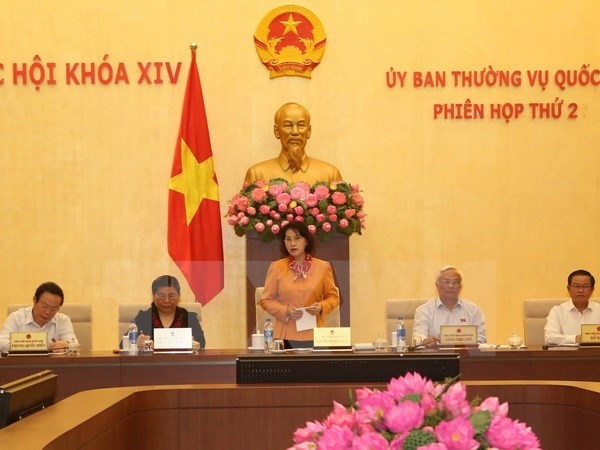 Politics & Law
Politics & Law

National Assembly (NA) deputies yesterday pointed out ambiguities and questioned the relevance of some provisions of the draft Law on Belief and Religion and the draft Law on Associations.
 |
| National Assembly (NA) deputies yesterday pointed out ambiguities and questioned the relevance of some provisions of the draft Law on Belief and Religion and the draft Law on Associations.— VNA/VNS Photo Phương Hoa |
HÀ NỘI — National Assembly (NA) deputies yesterday pointed out ambiguities and questioned the relevance of some provisions of the draft Law on Belief and Religion and the draft Law on Associations.
NA Chairwoman Nguyễn Thị Kim Ngân said the laws have to be amended and approved in order to institutionalise the Party’s perspectives and consolidate the constitutional right of all citizens as well as foreigners to believe or not believe in religions.
This would strengthen State management, she said.
The right to follow any religion or follow no religion is enshrined in Article 24 of the 2013 Constitution.
Deputies agreed that promulgation of the draft laws will contribute to realising the spirit and content of Constitution, and to making domestic laws compatible with international agreements and treaties that Việt Nam is a signatory to.
Many deputies questioned a provision in the draft Law on Belief and Religion which says the State will officially recognise a religious institution only after it has operated in the country for at least five years.
Once the institution registers its operations and meets all requirements, it should be recognised immediately by authorised agencies, they felt.
This opinion was shared by Bùi Sỹ Lợi, deputy chairman of NA’s Committee for Social Affairs.
He said the rationale for such a time frame as well as requirements for recognition should be made clear, he said.
Failure to do so could restrict the freedom to practice any religion, he cautioned.
Nguyễn Công Hồng, deputy chairman of NA’s Law Committee, said the draft was not clear on whether foreigners could set up religious institutions in the country.
NA deputy Tô Văn Tám of Kon Tum Province felt foreigners should be allowed to preach in Viet Nam, but only at religious institutions.
Several deputies also said that State management of religious affairs was undermined by delegation of tasks to different agencies. While the responsibility for managing religious affairs rested primarily with the Ministry of Internal Affairs, the Ministry of Culture, Sports and Tourism managed religious festivals, they pointed out.
Many deputies suggested that one relevant State agency is assigned the task of overseeing all religious affairs so as to ensure uniformity and ease in management. Some said the task should be given to the Ministry of Culture, Sports and Tourism.
Deputy Trần Duy Vượt from the Central Highlands Province of Gia Lai called for the establishment of an independent State agency to oversee religious affairs.
He said religious affairs in the Central Highlands region were very complicated, and it would be too much work for an agency like the Ministry of Culture, Sports and Tourism to tackle them.
In yesterday’s afternoon session, NA deputies debated provisions of the draft Law on Associations.
The said some of the articles in the draft law were irrelevant.
Deputy Nguyễn Sỹ Cương, member of the NA Committee for External Affairs, said he did not agree with the participation of State officials in non-governmental organisations because it would affect the discharge of their main official duties.
This was countered by Deputy Nghiêm Vũ Khải of Hải Phòng City who proposed that the NA allows Government officials to participate in non-governmental and other associations with the approval of authorised agencies.
Professor Hoàng Ngọc Giao, director of the Institute for Legal Policy and Development, noted that the annual administrative expenditure for all associations and social organisations in the country, including the purchase of vehicles, was estimated at between VNĐ45.6 trillion-68.1 trillion (US$202 million – $305 million). This is a large sum of money requiring regulations on the use of State budget funds, he said. All organisations should be required to account clearly for the use of State Budget funds, he added.
Giao suggested that the government gradually reduces subsidies for “special” organisations like the Viet Nam Chamber of Commerce (VCCI) and the Viet Nam Red Cross (VRC), and require them to fund themselves.
The two draft laws are to be submitted to the 14th NA session in October for approval. — VNS




